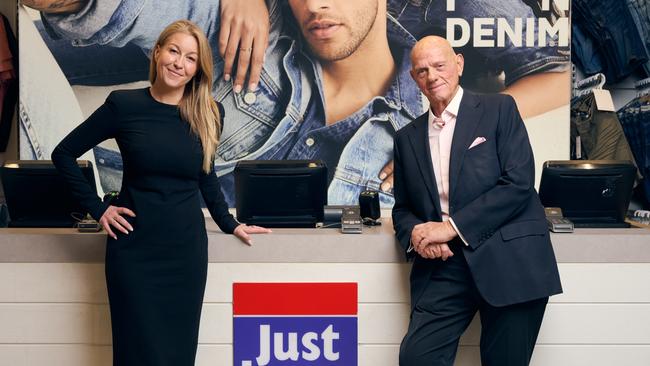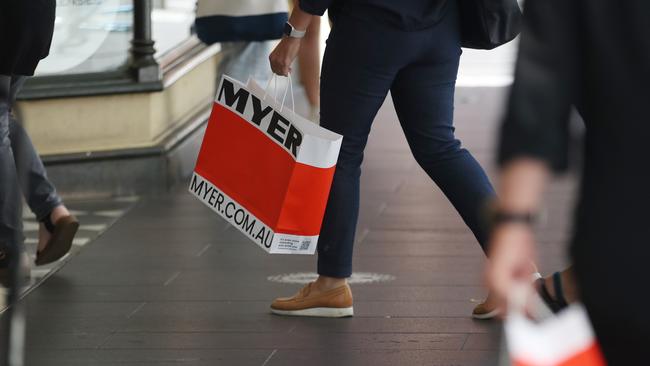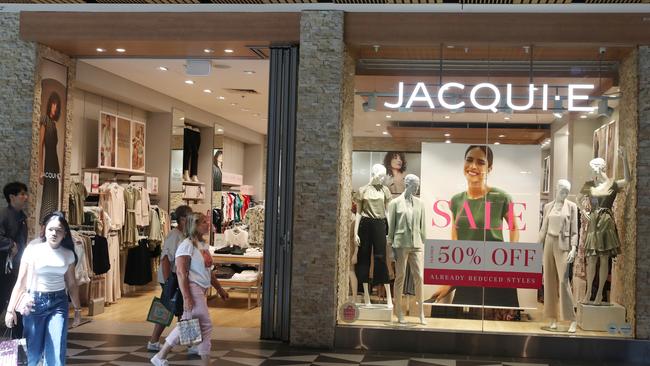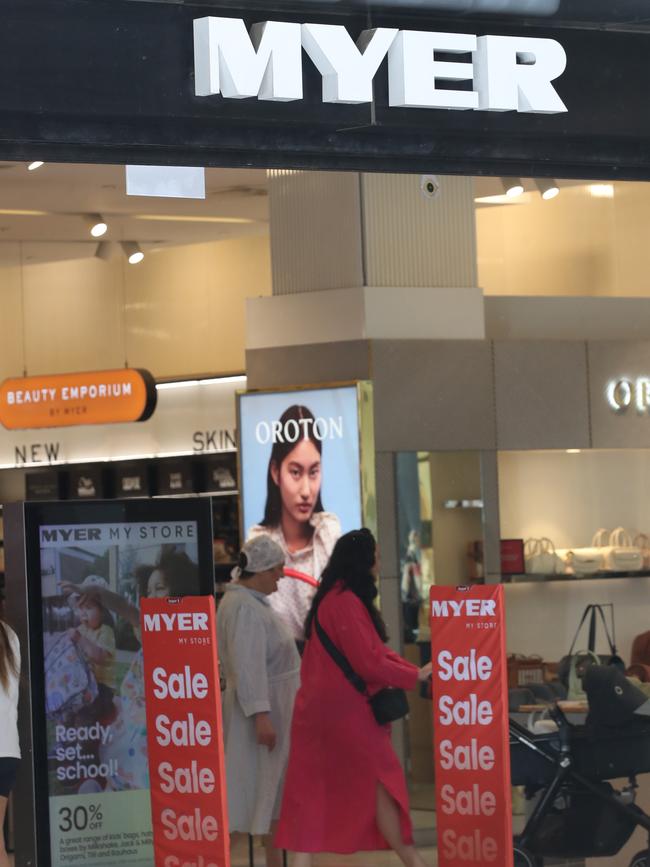Myer can be a $5bn retail power: Solomon Lew outlines vision
The $800m merger represents an all or nothing bet on the longer term future of Myer. And the retail billionaire Solomon Lew has big ambitions.

Business
Don't miss out on the headlines from Business. Followed categories will be added to My News.
Solomon Lew says Myer has hit a turning point and the new-look department store could become a retail powerhouse, delivering $5bn in annual sales in coming years.
Lew’s comments come after shareholders in both Myer and his Premier Investments empire overwhelmingly backed a $800m merger that will see his Apparel Brands business with brands like Just Jeans, Portmans and Jacqui E, folded into Myer.
In separate meetings held across Melbourne, Premier’s shareholders voted 99.8 per cent in favour, while Myer shareholders delivered a whopping 96.2 per cent support for the deal.
Lew voted his personal 42 stake during the Premier meeting, but Premier abstained from voting during Myer’s meeting. Heading into the vote, Premier controlled 31 per cent of Myer.
The deal, which is by the way of an in-specie share distribution, means Myer now becomes the new owner of Lew’s five Australian and New Zealand fashion brands. Each of the brands unashamedly targets the mass market. Nearly all are run for cash.
The deal massively expands Myer’s footprint, delivers more than 700 stores to the retailer, while critically it comes with some $82m of cash. The combined business will employ more than 17,300 full and part-time workers.

While Myer is doing the buying, the transaction all comes back to the retail billionaire Lew.
It follows nearly a decade of vocal agitation at Myer at the same time Lew’s Premier empire had slowly been increasing its investment grip on the retailer.
The structure of the share-based merger and distribution means Lew now personally emerges as Myer’s single biggest shareholder, with around 26.8 per cent, giving him plenty of skin in the game.
He is also set to join the Myer board from as early as next month, marking a return to the business after two decades. Myer’s executive chair Oliva Wirth remains in her current role.
Premier’s shareholders will emerge with 51 per cent of Myer, which means they are the ones taking a bet on the 125-year-old department store. And even with Myer’s business facing pressure from multiple fronts, Lew believes it's one worth making.
Lew tells The Australian from an early stage he was “never really interested in being a passive shareholder” in Myer.
“We don’t invest where we don’t have knowledge, and this is an area that we understand,” the Premier Investments chairman says in an interview.
Myer’s shares have re-rated since the deal was first flagged last June and despite a profit warning in recent weeks are more than 40 per cent above where they were trading before talks were confirmed. While there has been some criticism about the price Myer is paying for brands that represent mature and low-growth labels, the stores have no debt and generate high volumes of cash.
“We understand buying and selling, we understand (profit) margin,” Lew says. “We understand how to produce, and we understand how to design. We understand real estate from the point of view of the types of stores that we need and don’t need.”

He points out the Apparel Brands business generates more earnings than Myer on nearly a quarter of sales. The combination of Myer’s $3.3bn in annual sales with Apparel Brands will deliver a retailer with a turnover of more than $4bn.
“We don’t really need more sales, we just need more profit. But I do have personal aspirations that this business grow in the next three years to a $5bn business.”
This will come through rolling out Myer’s well regarded loyalty program to the Apparel Brands business and tapping into department store’s digital sales channel.
But the thing to be closely watched by investors will be Lew’s management team bringing its experience across to Myer in boosting wafer-thin margins. This has been much of the driving force behind the Myer share lift since the deal was announced.
“That’s why the apparel business joining the group makes sense because the ongoing margin is dramatically different.”
Apparel Brands’ management team will move across to Myer, including the current boss Teresa Rendo, who will join Myer’s executive team. Premier’s well regarded property team will move across to Myer.
Lew said he will provide input in the boardroom, but Wirth and her management are running the business.
“They’re the people in charge. That’s why I was very comfortable in her becoming executive chair when it was mooted at the time, from the point of view that she can make decisions and move on.”
Lew says the former Qantas executive “understands service because she came from a service industry where you needed to look after the consumer”.
Leading up to Thursday’s vote, both retailers issued a post-Christmas profit warning. This triggered almost a simultaneous share sell down for both Premier and Myer. Lew says it didn’t change the motivation for the deal.
“I went public some months ago and said this is probably one of the hardest times in business I’ve seen because I think that the consumer is stressed and worried, and, you know, there’s a battle at the moment in retail.
“We’re not concerned about it, because from my perspective this is the cycle at the moment, and it will certainly come back.”
Share surge
Myer’s shares jumped more than 6 per cent on the vote, pushing back toward the $1.00 mark. Although Sydney-based K Capital’s David Kingston (a one-time Lew adviser during the Coles Myer days) delivered dissent.
During the Myer meeting he argued the department store was vastly overpaying for Lew’s portfolio of brands. A profit downgrade from Apparel Brands just two weeks ago reinforced the point, Kingston said, the former Rothschild Australia boss. Myer had a terrible record of managing brands outside its core department store, he added.
The pressure is certainly now on Myer’s Wirth to make the merger work. Although highly experienced as an executive at Qantas, she is relatively new to the role and the retail industry. Her background is on loyalty, which is one of the big profit drivers of Myer.
Wirth says Myer couldn’t keep heading down the path it was on. The overriding question asked in Myer’s recent strategic review was about how to set the retailer up for the future. And the combination with a wider set of brands was “absolutely the right way” to set Myer up for the future.

“It became clear that there are a number of ways that we could grow for future. One of those particular areas was to strengthen the product availability as it relates to women’s apparel, apparel and children and there’s an opportunity for us to do better,” Wirth says.
The timing of the deal “is not about one simple trading period”, she adds, but it’s about pushing Myer to adapt in a challenging industry.
Notably, it has fired up Myer’s long dormant shareholder base. As Myer’s market cap shrunk in recent years investors big and small became less engaged. In recent years the number of investors voting at Myer’s annual meetings – including the more fiery ones – averaged around 1100. At Thursday’s meeting more than 3300 individual investors voted mostly in favour of the deal. Myer can count nearly 6000 shareholders with holdings worth over $4500. The retailer has more that 40,000 shareholders in total. The addition of Premier’s shareholders will see this jump to 50,000.
Originally published as Myer can be a $5bn retail power: Solomon Lew outlines vision




